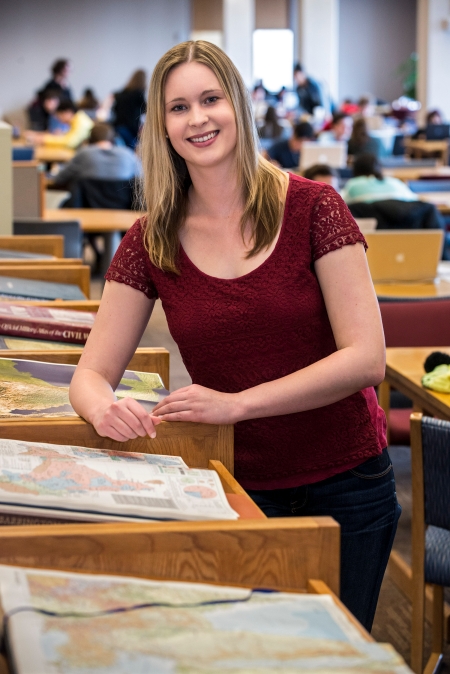
By
Hometown: Edmonds, Wash.
Major: Political science
Notable Activities: Presidential Scholar; US Department of State Youth Observer/Delegate to the United Nations; Undergraduate Research Fellowship with Prof. Ali Banuazizi (Political Science); education intern, Suffolk County House of Corrections; tutor, African Community Economic Development of New England; editor, Al-Noor: The Boston College Middle Eastern and Islamic Studies Journal; Empowering the Women of Afghanistan through Education and Islamic Teachings project.
Post-graduation Plans: Business analyst at Deloitte Consulting in Boston, followed by graduate studies in international law and diplomacy and/or international business.
Overview: Loughrin came to BC with a strong international background: study in India, a summer in Senegal, and a trip to Iran with an educational/cultural delegation. She has built on that foundation as a BC undergraduate, what with – among other things – a language immersion program in Tajikistan, research projects in Turkey and a yearlong stint as UN youth observer/delegate, for which she received a certificate of appreciation from US Ambassador to the UN Susan Rice. At BC or abroad, whether pursuing academic or service opportunities, Loughrin is very much a citizen of the world.
Even before you arrived as a freshman at BC, you had an impressive record of international study. How did coming to BC enable you to build on that?
What I’ve liked about BC is that students are engaged locally – through service and volunteerism – but also encouraged to pursue global-oriented opportunities.
In the same vein, I was drawn to the possibility of being able to explore both the Western cultural tradition and Islamic civilizations and societies. There are not too many colleges where you are able to study both the Bible and important Turkish or Persian works. That’s what makes BC such a special place.
Also, BC has quite a global reach. It seemed that no matter where I’ve gone – including Tajikistan – I’ve been able to find a BC alumnus, or someone with a BC connection.
What have these various opportunities to go abroad done for your world view? Has it made you hopeful? Pessimistic?
I’ve always been the impatient, optimistic type; I would say I am optimistic about human potential. That’s why I’m glad to have gone to a college that allows you to think critically. BC challenges students to look below the surface of what’s reported in the media, to assess the role of power and poverty in a country, and what kind of voice, if any, its citizens have. So you’re not just thinking about issues in terms of trade policies or politics, but people’s everyday lives.
Among all these experiences you’ve had while at BC, how does your time as UN youth observer/delegate measure up?
That was the capstone of what I’d been working on. I’ve had this overarching interest in expanding opportunities for women and young people, and there’s been a tremendous amount of mobilization for that. So I would travel with the State Department for up to two to three weeks at a time throughout the academic year to New York, Washington, DC, and Geneva and speak at UN-related events and consultations on topics ranging from the post-2015 Development Agenda to youth and women’s empowerment.
One thing that this experience, as well as others I’ve had, showed me is the need to reconcile the academic and the public policy spheres. I think the work produced in academia may not be as accessible in public policy circles, and vice versa, and there is a lot each has to offer to one another.
It bears mentioning that you actually have spent time on campus. What are some of the special experiences you’ve had?
I think Al-Noor was my favorite thing at BC; I loved working with students and faculty to publish this journal. More recently, I’ve been part of the Institute for the Liberal Arts’ project on raising awareness about Afghanistan, and I helped set up a “sister-school” partnership between female students at BC and Balkh University in northern Afghanistan. Also, we invited Dr. Sakena Yacoobi, a Nobel Prize candidate, to come speak; I got to spend the day with her, and she’s become a close friend and mentor.
This is another thing about BC: We get phenomenal speakers here, and students often get a chance to have informal, small-group or one-on-one conversations with them. It’s a tremendous opportunity for learning.
What will you miss about BC?
You mean, besides everything? I’ll miss being in such a rare community of scholars with such a range of interests, where you’re constantly challenged. I’ll miss the faculty – especially Dr. Banuazizi – because you can go into their office to ask a question, and three hours later you’re still talking with them. Faculty here care about students as whole people.
Meet our next 'Senior to Remember' Philip McHarris



